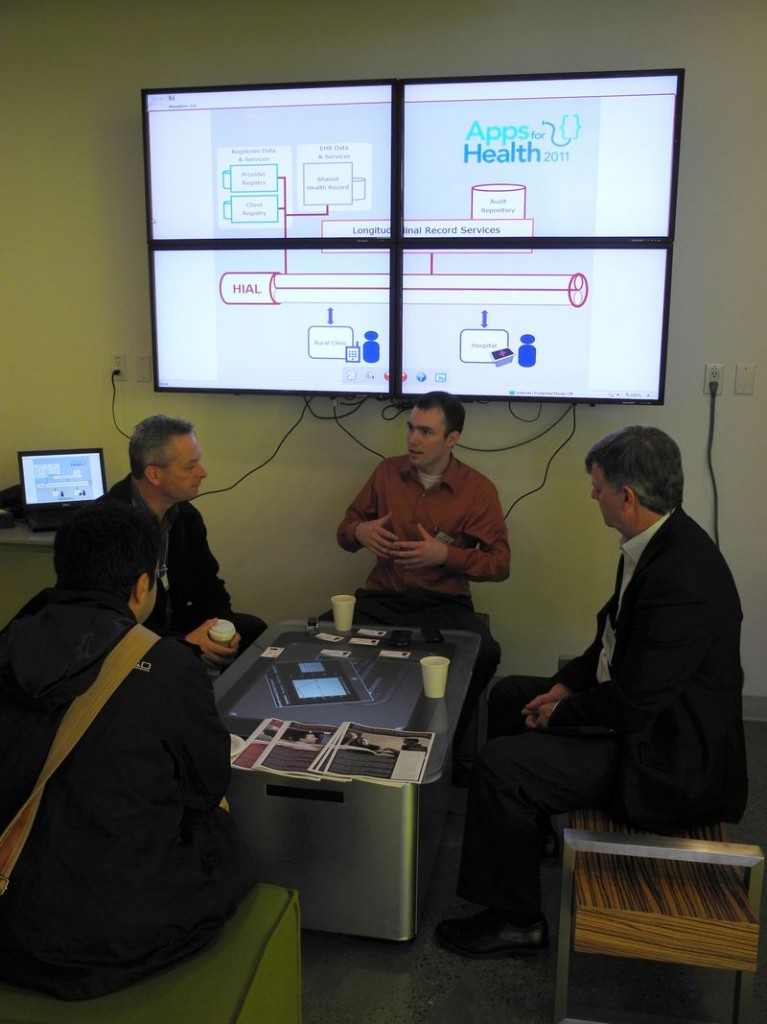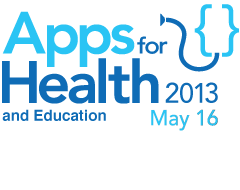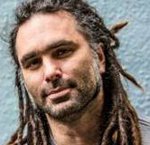Apps For Health returns in 2013
 In case you haven’t heard of it, Apps For Health is Ontario’s eHealth conference. The event has been running out of Mohawk College for the last 2 years and will be returning on May 16th this year. Mohawk College itself is making a big push into mHealth and eHealth with the Mohawk eHealth Development and Innovation Centre (MEDIC):
In case you haven’t heard of it, Apps For Health is Ontario’s eHealth conference. The event has been running out of Mohawk College for the last 2 years and will be returning on May 16th this year. Mohawk College itself is making a big push into mHealth and eHealth with the Mohawk eHealth Development and Innovation Centre (MEDIC):
MEDIC helps Canadian businesses, especially small- to medium-sized enterprises (SMEs) develop and commercialize innovative healthcare IT products and provides a centre of excellence for organizations undertaking interconnected healthcare projects. Through MEDIC, clients can access a working eHealth ecosystem, including the technology, know-how and industry contacts that are necessary in the development and commercialization of new health IT innovations. As an online “living-lab” environment, MEDIC allows stakeholders to work through a significant part of their development in a cost-effective, secure, efficient manner.
Pairing McMaster University’s world class medical school strength with the software development talent in Hamilton is obviously a promising opportunity for the city. Hamilton Economic Development and the Hamilton Chamber of Commerce had a great video produced last year that effectively overviewed the city’s strengths.
Apps For Health has been a great vehicle for fostering a community around eHealth and mHealth in the region. The event features panel discussions and talks across different streams (technology, health, education), as well as a student app design competition. The app design competition involves specific challenges posed by organizations like World Vision to solve interesting healthcare problems with mobile software. Last year I was invited to be on a discussion panel (UI design). What I really enjoyed most about the event was how directly the applications being discussed improved people’s lives (sometimes by saving them!).
 I’m likely biased because my research revolves around mobile educational software, but on last year’s panel discussion I suggested that educational software was the low-hanging fruit for mHealth. I think you can group eHealth applications into some different areas: IT solutions (electronic health records, data collection / monitoring / measuring / visualization, etc), education / wellness / preventative healthcare, automated diagnosis, and automated treatment. To me the potential cost-saving efficiency gains through IT solutions like eHealth records are both huge and technically feasible, but also difficult because of the amount of bureaucracy that can be involved in many cases. There’s been some interesting work done in automated diagnosis, with skin cancer detection apps and the Tricorder X Prize, but these problems remain very difficult. To me the holy grail for eHealth software would be automated treatment. We already have technology that allows doctors to treat patients remotely with robotic surgery. The next step will be to remove the doctor and have the software perform the surgery automatically. That might sound ambitious now, but I suspect that going into the future algorithms will outperform doctors and nurses at more and more tasks (though as always, don’t expect the human factor to ever be removed entirely). An “automated nurse” of sorts is apparently in the works, but I suspect automated treatment is orders of magnitude greater in difficulty than automated diagnosis.
I’m likely biased because my research revolves around mobile educational software, but on last year’s panel discussion I suggested that educational software was the low-hanging fruit for mHealth. I think you can group eHealth applications into some different areas: IT solutions (electronic health records, data collection / monitoring / measuring / visualization, etc), education / wellness / preventative healthcare, automated diagnosis, and automated treatment. To me the potential cost-saving efficiency gains through IT solutions like eHealth records are both huge and technically feasible, but also difficult because of the amount of bureaucracy that can be involved in many cases. There’s been some interesting work done in automated diagnosis, with skin cancer detection apps and the Tricorder X Prize, but these problems remain very difficult. To me the holy grail for eHealth software would be automated treatment. We already have technology that allows doctors to treat patients remotely with robotic surgery. The next step will be to remove the doctor and have the software perform the surgery automatically. That might sound ambitious now, but I suspect that going into the future algorithms will outperform doctors and nurses at more and more tasks (though as always, don’t expect the human factor to ever be removed entirely). An “automated nurse” of sorts is apparently in the works, but I suspect automated treatment is orders of magnitude greater in difficulty than automated diagnosis.
 Which to me leaves education / wellness / preventative healthcare as the problem of choice to tackle. There doesn’t seem to be the same bureaucratic headaches, and the technical feasibility is there right now to tackle these problems. That’s why I was happy to see that this year’s Apps For Health has an education stream, and they’ve even updated the logo to include “and education”. The thing with educational health software is that you can’t just dump information into an app and expect it to engage your target demographic. If people are already self-motivated they can just Google search whatever healthcare information they need. I’d wager that to really make these apps engaging to users that normally wouldn’t bother, a more novel approach like gamification is required. Again, I’m admittedly biased here, because my research has revolved around gamification. Gamification is a promising approach, but as Gartner research VP Brian Burke said when discussing a study that predicted 80% of all gamification apps will fail to meet their objectives by 2014, “you can’t just put badges on something and expect it to work”. All of this is why I’m most excited to hear the “Gamification Deep Dive” talk by Michael Ferugusson CEO of Ayogo.
Which to me leaves education / wellness / preventative healthcare as the problem of choice to tackle. There doesn’t seem to be the same bureaucratic headaches, and the technical feasibility is there right now to tackle these problems. That’s why I was happy to see that this year’s Apps For Health has an education stream, and they’ve even updated the logo to include “and education”. The thing with educational health software is that you can’t just dump information into an app and expect it to engage your target demographic. If people are already self-motivated they can just Google search whatever healthcare information they need. I’d wager that to really make these apps engaging to users that normally wouldn’t bother, a more novel approach like gamification is required. Again, I’m admittedly biased here, because my research has revolved around gamification. Gamification is a promising approach, but as Gartner research VP Brian Burke said when discussing a study that predicted 80% of all gamification apps will fail to meet their objectives by 2014, “you can’t just put badges on something and expect it to work”. All of this is why I’m most excited to hear the “Gamification Deep Dive” talk by Michael Ferugusson CEO of Ayogo.
 Michael is CEO of Ayogo, a company that has won many awards for the work they do creating mobile and social games that improve people’s health in meaningful, measurable ways. He has spoken eloquently about how games can increase patient engagement and improve health outcomes at the 3rd Patient Adherence & Advocacy Summit in February 2013, Health 2.0 in Berlin, Games for Health 2012 in Boston and the 2012 mHealth Summit in Washington to name a few.
Michael is CEO of Ayogo, a company that has won many awards for the work they do creating mobile and social games that improve people’s health in meaningful, measurable ways. He has spoken eloquently about how games can increase patient engagement and improve health outcomes at the 3rd Patient Adherence & Advocacy Summit in February 2013, Health 2.0 in Berlin, Games for Health 2012 in Boston and the 2012 mHealth Summit in Washington to name a few.
The line-up of student challenges for Apps For Health 2013 looks excellent so far:
- Support Assessment and Counseling for Children with Disabilities
- Assisting People to Self-Manage their Physical and Mental Well-Being
- Challenging the Stigma of Testicular Canfcer with Technology
- Mobile Solution for Calculating Correct Medication Dosages
I’ve bought my ticket for Apps For Health and I suggest whether you’re in the software, startup or healthcare industry in Ontario that you sign-up to attend as well. I can’t wait for Apps For Health 2013!
